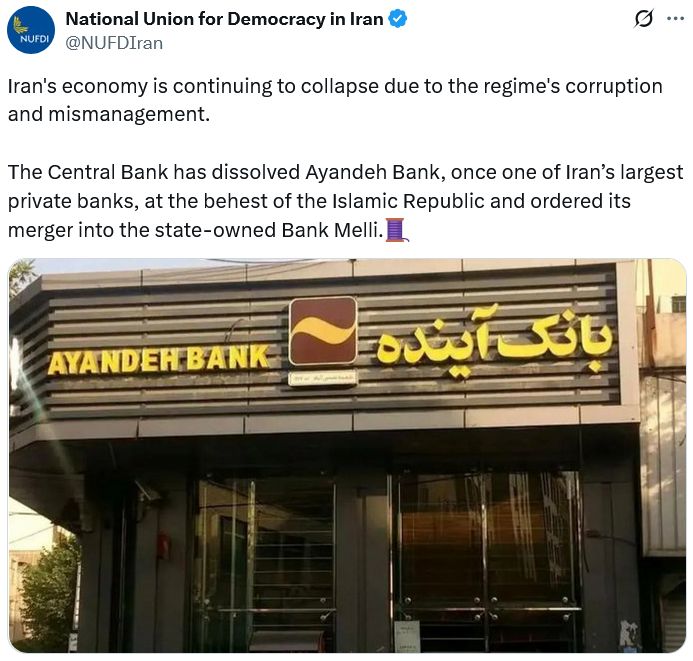Major Iranian private bank goes bankrupt, roiling 42M customers
One of Iran’s largest private banks has fallen into bankruptcy, with the assets of more than 42 million customers being absorbed by the Iranian state-owned lender, Bank Melli.
Ayandeh Bank declared bankruptcy on Thursday after it accumulated $5.1 billion in losses and nearly $3 billion in debt, local media outlet Iran International reported on Friday.
The bankruptcy was declared days after the Central Bank of Iran failed to rescue the bank, leaving officials with no option but to close it, which had operated 270 branches nationwide.
More than 42 million customers were affected, Iran News Update reported.

While CBI Governor Mohammad Reza Farzin assured Ayandeh customers that they will be able to recover their savings immediately, the incident highlights the risk involved in trusting banks that lend out customer deposits, operate with fractional reserves and seek bailouts when things go wrong.
Failures in the banking system were seemingly one of Satoshi Nakamoto’s motivations for creating Bitcoin, as evidenced by a message embedded in Bitcoin's genesis block that references the UK government bailing out banks.
Meanwhile, one of the catalysts of Bitcoin growth in the last few years was the US local banking crisis in early 2023, where Silicon Valley Bank, Signature Bank, and Silvergate Bank filed for bankruptcy or were forced into liquidation.
Bitcoin’s price rallied from below $20,000 to over $29,000 in that month as public trust in the US banking system waned.
Earlier this month, Reuters — citing a report from Morningstar — noted that regional US banks were still showing signs of financial stress despite boosting reserves and customer deposits since March 2023.
Eight Iranian banks are at risk of dissolution
Iran’s banking system has become fragile due to widespread sanctions, which block access to international financial networks, restrict US dollar transactions and heighten risks in the local banking sector while the Iranian rial continues to lose purchasing power.
Earlier this year, the Central Bank warned that eight other local banks risk dissolution unless they implement reforms.
Iranian crypto exchanges haven’t been without problems either, as Nobitex suffered an $81 million hack in June.
It was one of the biggest contributors to Iranian crypto flows falling 11% up until July amid a series of conflicts with Israel.
Disclaimer: The content of this article solely reflects the author's opinion and does not represent the platform in any capacity. This article is not intended to serve as a reference for making investment decisions.
You may also like
India Extends Crypto Reign as US Closes In With 50% Surge

Bitcoin Updates Today: Investors Turn to Bitcoin ETPs as Secure Investments During Fed-Related Uncertainty
- Crypto ETPs saw $921M net inflows last week, driven by Bitcoin's $931M surge amid Fed rate-cut expectations. - Ethereum faced $169M outflows for first time in five weeks as investors shifted to Bitcoin as a macro hedge. - U.S. ($843M) and Germany ($502M) led inflows, with BlackRock's Bitcoin ETP attracting $324M alone. - Market awaits Fed's October 29 rate decision (97% cut probability) and T. Rowe Price's crypto ETF filing.

Solana News Update: Digitap's Visa Integration Connects Cryptocurrency with Traditional Finance
- October 2025 crypto market sees Solana ($SOL) and XRP reclaim key price levels, driven by mainstream adoption like Gemini's staking-enabled credit card offering 6.77% yields. - Digitap ($TAP), a Visa-partnered "omnibank" project, raises $1M in presale with AI-powered cross-border payments slashing fees to under 1%, attracting 5,000% rally predictions. - Market shifts toward utility-driven projects as Digitap's beta app enables crypto-fiat interoperability, while Solana's institutional adoption via MiFID

Pharos and Chainlink connect traditional finance and decentralized finance to make tokenized assets accessible to everyone
- Pharos Network integrates Chainlink's CCIP and Data Streams to secure tokenized real-world assets (RWAs) and enable cross-chain transfers. - The collaboration bridges traditional finance (TradFi), DeFi, and RWAs, aiming to democratize institutional-grade tokenized asset markets for individual investors. - Chainlink's infrastructure delivers low-latency pricing data and secure cross-chain operations, enhancing scalability and mitigating front-running risks through "commit-and-reveal" architecture.

